Episodes

Thursday Jun 06, 2024
This All Used To Be Fun, And It Will Be, Again
Thursday Jun 06, 2024
Thursday Jun 06, 2024
From the factory floors of the auto industry, to the savage trading floors of the twilight days of Old Wall Street, to the rarefied air of automated media solutions and AI, our first guest of the new era, Charles Benaiah, has seen and done a lot, and he shares his perspective on a number of interesting things with us.
He also runs a fantastic newsletter that you can read and sign up for at https://uncharles.substack.com/
These interesting things include, but are not limited to:
-How Wall Street of yore, and the ad industry of recent times and today, has become a bit more boring and less human as things have been commoditized and automated.
-What using the internet, from search to content consumption, might look like in five years, and what parts of it will be ad supported and how.
-The potential for increased ad personalization not simply because it is possible, but because these future formats are better suited for it.
-Once audiences move to new discovery and content consumption platforms, advertisers will follow, but how will they monetize until that happens?
-In car advertising as the next major frontier in high-quality attention and audience, and why this hasn't been fully capitalized on yet
-Charles's audio app product Gia, an early exploration of AI informed audio
You can also follow Charles on LinkedIn at https://www.linkedin.com/in/charles-b-a060a7143/

Thursday Apr 18, 2024
Retail Media Is Boring
Thursday Apr 18, 2024
Thursday Apr 18, 2024
The podcast returns after a multi-year hiatus with new AI-powered co-host Matt Walsh.
Retail media is boring as it currently stands is the first topic to tackle.
What people talk about it as: an omnichannel revolution that will utilize incredible technology to free advertisers and retailers and eventually publishers from the tyrannical grasp of Google and Meta.
What It Really Is: A bunch of people overpaying for Criteo search ad and product display clicks when they're not buying toxic dump grade open web inventory from shady publishers, all while running into the open arms of such scrappy underdogs as...Amazon and Walmart?
Plus, why is everyone assuming these new players are going to solve a viable inventory shortage problem that Alphabet has moved heaven and Earth to solve for years and still hasn't really fully escaped?
A lot of money is going to be spent on it anyway, though, and maybe by listening to this you can learn how to open up a mining supply store close enough to this gold rush to retire early, or before Retail Media 3.0 arrives in 2045, at least.
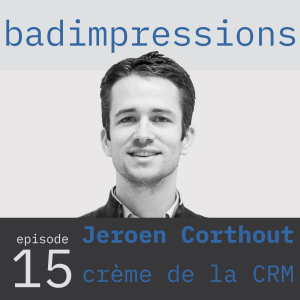
Tuesday Aug 10, 2021
Creme de la CRM
Tuesday Aug 10, 2021
Tuesday Aug 10, 2021
We ran strings across the Atlantic for these tin can mics we use, so that we could have the immense pleasure of speaking with Jereon Courthout, CEO & co-founder of Salesflare (https://salesflare.com/) which is a CRM for small businesses in the B2B space.
He speaks with us a bit about a key strategy he uses for growing and thriving in the ferociously competitive CRM software space, which is both flooded in terms of total number of competitors with 650+ active CRM software companies, and also includes some series behemoths, spanning both both enormous public companies and VC cash-stuffed newer entries to the category as well. Growth in standard, simple channels like most advertising spaces isn't easily attainable for any CRM company, and so Jeroen and company have needed to become ultra-thoughtful in their efforts.
This key strategy he discusses, derived after a few years of running the company, was moving their core management focus from working on individual and teams goals, to working on individual and team habits. Goals are still a part of the company's methods, but the focus on a day-to-day and week-to-week level has shifted to adopting better habits. This leads to strong results when the monthly, quarterly, and annual goal checks do come around.
We also talk about how and when to automate customer relationship elements, and how to get there. Jeroen's guideline is to never robotize anything that makes you seem more robotic to the customer, and focus on automating the customer interactions that make real human salespeople feel like robots. Preserve all of your quality time with customers, trying to automate any of that away is a trap, only seek to eliminate garbage time. Jeroen says anything that leaves a Bad Impression (SNAKES ON A PLANE MOMENT ACHIEVED) with the client should be ditched immediately.
We talk about how there are a lot of annoying chat bots that are prime examples of over-automation, including some surprising bad examples from makers of chat bots themselves, though Jereon does think GPT3 and other advances in ML around conversation mean we might see a new wave of truly useful new chatbots coming soon.
Jeroen details how to set yourself up for success when CRM shopping, and starts with noting you should understand that whatever kind of company you are, there's a niche of CRM companies for your industry, and then plenty of companies, including the large generalist CRMs, which might not be a good fit for you at all.
You should also try multiple CRM systems, and trying them means trying them with everyone on your team who will use it. The CRM with the highest % of people using it, because they're comfortable with it, will almost always be the best.
Thirdly, trying it with the whole team requires you to set some standards and build some consensus up front around how the CRM will be used. Ten people recording things ten different ways will result in unmanageable chaos, so some legwork upfront will ensure your whole-team trial goes well.
Jeroen, and the hosts, all dislike RFPs and RFIs. Absolute box-checker trash. Do not RFP our podcast for media, you are not going to like what we decide P stands for. "Nice request for Poop Jokes, we'll get back to you with something this afternoon" and with our maturity levels, buddy, that will be a 130 slide deck. Salesflare undoubtedly have a much more mature and helpful request, but still, make sure it's a well-intentioned and crafted RFP if you're going to send one of those to anybody.
For those of you looking for more CRM tips to close more deals, Jereon does a regular webinar you can sign up for at https://webinars.salesflare.com/how-to-use-a-crm/

Wednesday Jul 14, 2021
E-com Kart
Wednesday Jul 14, 2021
Wednesday Jul 14, 2021
We're talking about e-commerce, which has come a long way, baby, but might be in for a slowdown. Who can you trust to report accurately on said possible slowdown? Nobody who already has bets placed on this party never ending! Trust your instincts and look at your sales data, or trust our guest this week, Luigi Ferguson.
The increasingly permeable barrier between physical real world stores and digital online websites continues to blur. David has invented something beyond "show rooming" where he goes into the store first, then leaves and buys online in his car from the parking lot, and then picks up in store. You have to listen to understand it, it's complicated.
False scarcity stinks, in Lee's opinion, and is hitting a weird fever pitch that interacts in strange ways with real world inventory, and to Luigi's point, what consumers can see with their own eyes. If you've never ever sold out of something and have been selling it for a couple years, people have the memory and if not that than in some cases the tools to see when you're lying.
Randy talks about streaming media and can't help using it to remind everyone that she's the Zoomer who loves physical stores and loves physical books and loves laying down on a fainting couch to balance her physical humors just like Dr. Leechbleeder said to so she doesn't get the Vapors. SHE'S SO OLD!!!
Customer experience is a differentiator so strong that it now builds and defines the boundary of what constitutes community for a brand. How to determine when you're really ready to find community in a new place, versus what's just part of your standard testing of channels regimen, is covered by the group.
The power of speaking directly with customers over using large fields of data in many cases, especially if you know how to pick your spots. Luigi notes that the best service experiences that people remember tend to be one person just going all out to make something right with an order, and these moments merit study.
The limited appeal of personalization over someone's real needs and feelings in any given moment is eloquently explored. It's okay to be boring and a big brand in certain contexts and moments if that's more authentic that the alternative.
What skills will the greatest e-com workers of the future have cultivated? Where will they work? How can you hire them? All will be addressed in the episode for which you are currently reading a summary. Go ahead and press play, and listen to Luigi when he tells you to re-emphasize quality over quantity.
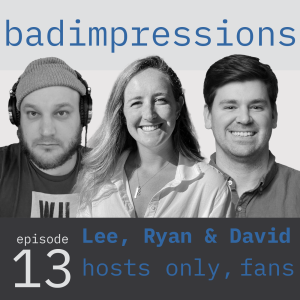
Tuesday May 18, 2021
Hosts Only, Fans
Tuesday May 18, 2021
Tuesday May 18, 2021
Our fans only want one thing, and it's disgusting.

Tuesday Apr 20, 2021
FLOC Party
Tuesday Apr 20, 2021
Tuesday Apr 20, 2021
This episode is actually barely about FLOCs, which it turns out are one of the least important topics up for discussion in this current transitional era, but look, when we were workshopping titles, there were just dozens of very funny FLOC related ones and we never could crawl out of that rabbit hole.
We go birdwatching with Larissa Licha, Chief of Staff + Product + Design + Engineering at NextRoll. Specifically, we kick things off keeping track of the FLOC of bird codenamed Google products that are ruffling the feathers of a great many advertisers. The truth is that while things are presently quite confusing, how worried you should be about the G-Fox depends heavily on how you built your henhouse. Lots of people are clucking a bit much for never even having counted their eggs or sorted their baskets in the first place.
All bird jokes aside, Larissa does actual work on proposals for the Google working groups with other companies, such as NextRoll, on actually developing the prospective solutions being put forward to resolve the tension between identity and privacy in online advertising.
Larissa's recommendation is to start by identifying your actual existing dependencies on third party cookies and work from there, utilizing any first party data you have to bridge what gaps you can, and then do something like move more towards incrementality-based marketing frameworks, which really you should have been doing this whole time anyway. Larissa used to tell people to turn off her own product if that was what it took to get the incrementality train going, which undoubtedly pleased lots of AdRoll P&L people to no end.
We touch on how digital media as a navigational aid is real, and there are situations where last click isn't the worst thing in the entire world, which is the opposite of most of the marketing world, where a bunch of people who have in reality never even done any other kind of attribution in a meaningful way spend their time talking tough about how much they hate Ye Olde Default Attribution Model.
The future congress member from Brooklyn by way of Germany speaks at length and in-depth regarding how this really might all be worst for small businesses, and Larissa seems a lot more earnestly concerned than a certain Jessie Eisenberg lookalike who had his scribes pen a humble missive in a local paper. The scale at which many small businesses operate, especially in terms of recording valuable website actions, is simply too small for these new privacy measures in most cases.
The group discussed that SMB is a huge opportunity that deserves a new and novel approach from many types of marketing platform. Alas, the average slouch of slugs comprising many enterprise-sized marketing solution teams CAN'T HACK IT! Hopefully some bold new challengers ready to forge their future products in the hot, hot crucible of SMB services emerge soon.
Digital media on real TV screens seems very effective as a format, except when it's not. Larissa is never going to buy a car, but can sing the Ford jingles from memory because certain providers neglect to cap frequency. Lee talks about how Hulu in particular is extremely bad about this, and kind of keeps kicking this long-dead horse for a while, despite being a very satisfied customer of the actual video product itself. In fact, he pays extra for that lovely service so he doesn't have to look at the absolute frequency-of-fifty-plus dumpster fire that is the ad product. David worries we'll lose cheap but charming local TV ads.
We also talk cashback offers in banking platforms and how they tend to be only big brands, which gives everyone a chance to engage in some very high quality coastal elitism. Atlanta company Cardlytics comes up as the principal purveyor of overdraft notice adjacent temptations, which in Randy's case includes some pretty incredible deals on Golf Digest. Larissa thinks being too margin focused and fearing SaaS pricing holds many ad tech companies out of great opportunities, including those with SMBs.
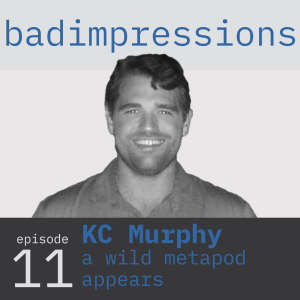
Wednesday Apr 07, 2021
A Wild Metapod Appears
Wednesday Apr 07, 2021
Wednesday Apr 07, 2021
It's an advertising podcast about podcast advertising. That's it, we're not selling it any harder, we know you're lining up around the block for this one. Took the day off from work, sunscreen on, bottled water, hoping we don't run out of the ribs before your turn at the front of the line.
Luckily we have master Podcast Pitmaster KC Murphy, who has been helping brands select particularly primo pieces of podcast over at Barstool Sports, who are smokin' more ear meat than anyone in the game right now. This is how we have elected to tell you that he is the Director of Performance Marketing at Barstool Sports, with this extended barbecue metaphor.
We go through podcast history, starting with the Cretaceous Comedians who had to come first so that their bodies could sink into the geographic strata and become the sweet, sweet crude oil that modern podcasters are using to fuel a global audio economy.
How radio evolved successfully into this, at least in part, is discussed. The Local Zoo Crew did pioneer host read ads, which possibly remain the most powerful format alive today. A certain podcast the name of which ends in -town and their confoundingly effective live read ads come up.
The conversation gets much more modern when we talk programmatic podcast ad buying and the proliferation of platforms, tied to particular inventory sources or not. The different relative values of digital ad insertion products vs. host live reads, and the different situations in which each is optimal. What brands have done well, what brands will do well in the future, and what roads might have looked good previously but lead to ruin now are covered.
The gang also discuss the prospects and future direction of this advertising podcast itself, bringing everything to maximum meta levels for a thrilling conclusion!
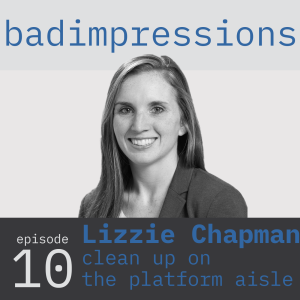
Wednesday Mar 24, 2021
Cleanup On The Platform Aisle
Wednesday Mar 24, 2021
Wednesday Mar 24, 2021
We talk with Lizzie Chapman, VP of Technology Platforms & Channel Sales at AdRoll, on a number of topics, but principally: why the hell is everything a digital media buying platform now? Murder Kroger has a DSP, Bomb Kroger has a DSP, other grocery stores that are not notorious nicknamed Atlanta area Kroger location presumably also have ad buying platforms. It's madness!
Earlier examples of other platforms hat built media in modern times are discussed, and that those that succeeded did so more so on content suitable for ad adjacency, and a content engaged audience, versus adjacency to a commercial operation, is noted. Sure, Reddit doesn't have a grocery store, but Safeway can't build you an Incel Fathers audience segment or offer you "Body Pillow Waifu Selfies" as a contextual targeting option. (Ed. note: Lee does not use Reddit, he just reads about it on Twitter, sorry, this is just all he "knows.")
What's next, r/cerealaislebets?!?!?! (Ed. note: Sorry, cutting all the rest of his Reddit jokes after this.)
Everyone declares a grocery store allegiance in terms of which they would help build their offering. Market Basket, Vons, Publix...the choices are very telling re: the regionality of grocery store chains, which is a major factor in this ecosystem from a marketing standpoint.
The coming issues major platforms will have with creating and running vast ad impression marketplaces may factor into this, as may heightened awareness brands are developing around impression quality. Managing several more point solutions for media is more appealing when the dream of vast de-duplicated and digitally targeted campaigns has lost some its luster in the current tech + privacy environment.
It's also noted that online environments in which people have already come to shop, or with shopping adjacent intent, have actually always been premium real estate.
Everyone wonders who will do well helping brands manage this, and worries that certain groups and class of organization may not be able to get away from the only thing they know: creating and exaggerating complexity so they can bill a lot of hours helping people solve it.
It turns our David has a second podcast about nautical matters, which we learn when he slips up and starts talking sextants. The need to measure everything is choking better ideas than "we need to measure everything" and warps incentives versus clarifying them. The whole lots of us need to go to some sort of first party data rehab facility.
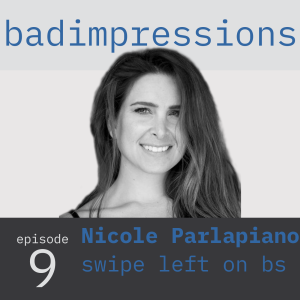
Wednesday Mar 10, 2021
Swipe Left on BS
Wednesday Mar 10, 2021
Wednesday Mar 10, 2021
Everybody is absolutely flipping out about the still completely unknown implications of the various digital measurement storm clouds gathering on the horizon...but not Nicole Parlapiano, VP of Advertising at Tinder. Nicole, known for her mild temperament, reserved mannerisms, and lengthy calm spells, has a message for all the marketers caught in an endless information spin-cycle about Apple iOS14 and Google FLOCS and whatever else is inducing unnecessary panic.
That message, dearest gentle-minded and tender-souled listeners, is:
Take a deep breath and get back to basics.
It's not going to be easy, but it's fairly simple-everyone is going to have to pick back up some tried-and-true marketing ideas that never actually stopped working, and blend them with what few modern machines might keep running okay as we enter the Age of Digital Privacy. She's also fairly certain this will all be good, because being more thoughtful about consumer privacy will be positive for brands. Additionally, if psychology-driven customer centric thinking were to make a much needed and long overdue return to every element of advertising, it just might work wonders.
We've created all this complexity for ourselves, honestly, and now it's also on us to explain that to senior executives and other people who haven't been as close to the Constantly Escalating Complication Cook-Off that's been happening in the advertising kitchen for over a decade.
There's also some very interesting information to be had on how people ACTUALLY dated during the pandemic, and what this may say about how all of our behavior will and/or won't be different forever after the Quarantine Era. A look at how our frenemies the Zoomers are doing is also part and parcel of all this.
We also examine the strange ethical and moral positions major digital platforms end up taking on certain issues, such as dating, sexuality, pornography, cannabis, etc. You know, all the good stuff. The Too Big To Fail set of digital ad platforms certainly seem to have some strong opinions if you look at the real policies that actually impact advertising on their platforms, including for products that most people might consider completely innocuous at this point, such as dating apps for the general public. These restricted categories contain things that might be a little less dangerous than, say, oh, I don't know...(checks notes on the last few years) lots of what is at the very core of these large digital advertising platforms' own businesses?
Lee gets swiped left on by Tinder, the whole app itself, via a verbal warning from Nicole to stay off the platform, issued due to his ownership of an Android phone. Truly, no demographic is more wretched in the eyes of marketers than those who live in The Green Bubble. David bets his salary that Facebook and Instagram have wrecked more happy homes than any dating app. Ryan realized she may or may not still be in dozens of "It's Complicated" relationships on Facebook with high school and college friends, suggesting the existence of a Polycule so large and strange and powerful that it's theoretically a greater threat to all of California than the San Andreas Fault.
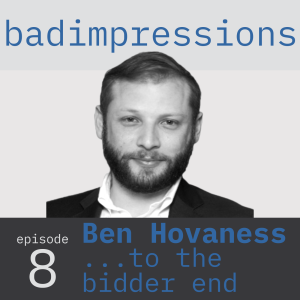
Tuesday Mar 02, 2021
...To The Bidder End
Tuesday Mar 02, 2021
Tuesday Mar 02, 2021
Tough week here at the podcast, as our Acronym Interpreter is on vacation, but the good news is that we're joined by Ben Hovaness, Scott Van Pelt of Marketplace Intelligence at Oh My God, for a thrilling discussion on the lack of transparency in the auction dynamics of most digital media. You don't actually know what's happening in between your bid and the outcome, win or loss. You don't! Not even on Google Search, but especially not everywhere else! The good news is Ben has some great thoughts on how to determine how much you should worry about this, and what could be done if you would indeed like to be a Carelord about it. It is, briefly...time for some game theory.
We also get the lowdown on the Council on Accountable Social Advertising, or CASA, which is pronounced like NASA, as Ben is very particular about his acronyms and despises when they're unpronounceable. We almost named this episode "CASA Bonita!" or "CASA De Subastas" to try and make a bunch of people learn it wrong and infuriate Ben, but he's too nice for that kind of treatment. This is no guarantee we wouldn't sabotage future guests in a similar manner.
CASA are bringing controls that mirror those deployed in more traditional paid media formats, to six major social media platforms. Ben elaborates on the how, the why, and what CASA does and does not dictate, as it aims to be an open and available framework for brands to use as they please, rather than a deliverer of fire and brimstone sermons. We wonder who gets to say what is and isn't brand safe, and in a shocking show of support for the plight of Floridians, Ben says he feels genuine sorrow and sympathy for anyone being forced to wrestle Jell-O.
The shortage of fine rubies and Manhattan penthouses being more explicable than the shortage of TV GRPs in the scatter market comes up. "How many nines are you willing to pay for" is a great question, it turns out. Everyone dares Lee to start a lifestyle brand. The gang asks Randy what it was like being strapped to five different rockets (ad platforms) and shot into space (managing said five ad platforms alone). Everyone agrees, albeit for different reasons, "Added Value" is due for a reckoning.
Ed. Note: Ben Hovaness is actually the Senior Vice President of Marketplace Intelligence at Omnicom Media Group, Lee is an idiot if he's actually been paying an Acronym Interpreter this whole time, especially as the Podcast Central Planning Committee gave him no budget for this. He is also neither bilingual, nor allowed to unilaterally name the episodes specifically to antagonize our wonderful guests.

